National football team of the German Democratic Republic, or East Germany could be unknown for the younger football fans. But its history deserves to be known.
After World War II, the defeated Greater Germany is divided between East and West. Two national football teams will emerge from this split. In this article we will talk about the East German National football Team, called the German Democratic Republic, DDR, the initials of the German name, or East Germany.
East Germany was founded in 1949 on German territory that came under the occupation of the Soviet Union. This nation subsisted until the Berlin Wall fell in 1990 and the unification of the two Germanies took place in what we now know simply as Germany.
Throughout the existence of East Germany there were tensions resulting from the Cold War between the western bloc and the communist countries, with struggles to demonstrate which political and economic management was more efficient, whether those of western democracies with capitalist economies or the countries communists with state-planned economies. In fact, West Germany did not recognize Democratic Germany until the 1970s, considering the nation as a territory under Soviet occupation. Berlin-East was the capital divided by the Berlin Wall.
This was very broadly the political context. But how was the history of thefootball team? Was it overshadowed by the football power of West Germany? Let's look at its history.
The players of the East German team came from teams from the Eastern territory such as the Dynamo in Berlin, the Lokomotiv in Leipzig, the Dynamo in Dresden or the Carl Zeiss in Jena, Magdeburg, FC Karl-Marx-Stadt, Hansa Rostock who played in the first division of the East German league, the DDR Oberliga, organized by the Football Federation of the German Democratic Republic.
Of all these clubs the Dynamo Berlin was the team that won the most titles, with 10 DDR Oberliga titles, after the Berlin club was the Dynamo Dresden with 8 and FC Vorwärts Berlin that took 6 leagues, followed by Jena, Magdeburg and Karl-Marx-Stadt with three leagues each. In the international arena, Magdeburg was the only one to claim a European victory, specifically the 1974 Cup Winners Cup against AC Milan, a milestone in the Iron Curtain period.
However, it should be noted that today of all these clubs, none play in the Bundesliga, the first division of the German league and only three of them are in the second division; Energie Cottbus, Rostock and Union Berlin. As in other areas of German society, reunification did not occur on equal terms to the detriment of East Germany. Many of these teams were gradually being relegated to lower categories and lost the glory they once had, including FC Berlin, which is in the Fifth Division, or the Dynamo of Dresden, which plays Third Division, or the successful Magdeburg, which plays also in lower categories, specifically in the Fourth Division.
As for the selection of the DDR of the German Democratic Republic, it was nurtured by the potential of these teams but was not as successful as its rival from West Germany. Possibly the reason has to do with the difficulty of controlling what happens in the field by the political power. football is unpredictable and in the communist bloc they preferred to dedicate resources to athletics or individual sports where athletes were controlled even with doping. Much has been said about this tragedy for many athletes. Among others, this could be one of the possible reasons.
SIGNIFICANT RESULTS OF THE DDR NATIONAL FOOTBALL TEAM AT THE WORLD CUP, EUROPEAN CHAMPIONSHIPS AND OLYMPIC GAMES:
His participation in World Cups was very limited, he participated in the 1974 World Cups and got eliminated in the round of 16. He also failed to qualify to play in a Euro Cup.
His greatest football deployment was at the Olympic Games. And it is not surprising since the Olympics were the best showcase for the communist countries, where they showed their sports power, their iron discipline through the medal count of their athletes. In the Olympics, the two opposing sides of the Iron Curtain fought.
1974 World Cup
It is the only World Cup in which East Germany participated, the DDR and had truly stellar moments that have been left for history, such as the match that was played between the two Germanies that won, 1-0, the DDR in a duel in the prestige of the two blocks was at stake. They had fallen in the same group in phase 1 and the German team from the GDR was in the first position in this group. Great stars like Beckenbauer, goalkeeper Sepp Maier, Breitner, or Müller played in the West German team. Hence, Jürgen Sparwasser's goal was a symbol. In the GDR team, we find great players like Joachim Streich, Hans-Jürgen Kreische, and Eberhard Vogel the three great scorers for East Germany.
But in football, fate tends to be cruel with the less strong teams and in the 1974 World Cup, the West German team will finally be the winner, leaving East Germany in the sixth position. The reason; by winning the East to the West the Westerners fell in the next group stage easier which allowed them not to have to face for example Brazil.
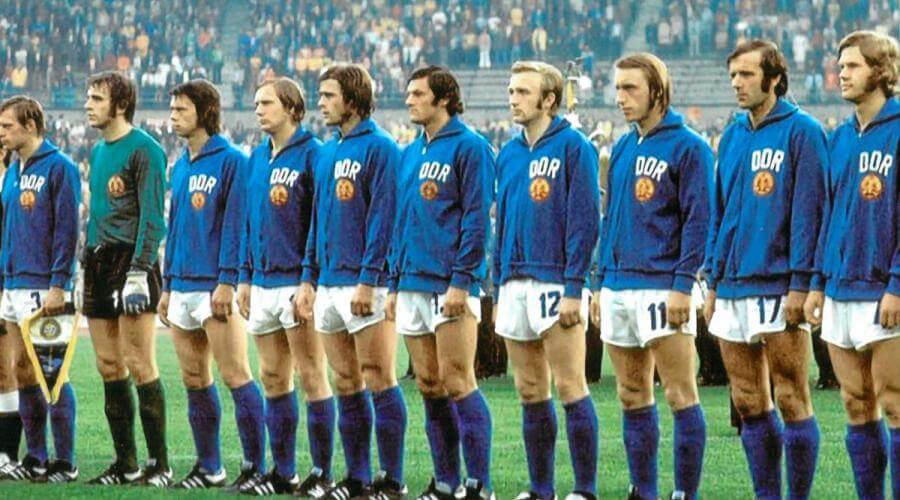 East Germany (DDR) World Cup 1974
East Germany (DDR) World Cup 1974
Gold Medal at the 1976 Montreal Olympics
His participation in the Olympic Games left a good trail of triumphs such as the Gold Medal at the 1976 Montreal Olympic Games where they beat Poland in the final 3 to 1 with goals from Hartmut Schade and Martin Hoffmann and Reinhard Haefner. The Soviet Union took the Bronze Medal, which certifies that the football teams of the Eastern bloc attached great importance to the football teams in the Olympic Games.
Silver Medal at the 1980 Moscow Olympics
Four semi-finalist football teams from Eastern countries battle to reach the final at the 1980 Moscow Olympics, the German Democratic Republic, the Soviet Union, Czechoslovakia, and Yugoslavia. The final will be played between the football teams of East Germany and Czechoslovakia, which will win by 1 goal to 0. In the German team, Wolfgang Steinbach will play among others, who took the title of best player in the history of Magdeburg.
Bronze Medal at the Olympic Games in Tokyo 1964 and Munich 1972
In the Tokyo 64 Olympics Germany will be third after winning the match for the Bronze Medal against the United Arab Republic 3 to 1. It will win the Gold Hungary and Silver Czechoslovakia.
At the Munich 72 Olympics, the East German team will win the match for third place against Blokhin's Soviet Union. Gold will go to the Polish football team and the Silver Medal to the Hungarian team. In the German team, we find players such as Bernd Bransch, the captain, Jürgen Pommerenke, Jürgen Sparwasser, Hans-Jürgen Kreische and the goalscorer Joachim Streich and the goalkeeper Jürgen Croy.
DDR MYTHICAL FOOTBALL PLAYERS - EAST GERMANY FOOTBALL LEGENDS
The DDR football gave its iconic figures that remain in the memory of all East German supporters.
It is worth remembering through a review of some names:
Internationality: Joachim Streich, the famous DDR-Oberliga striker who boasts the most internationality in the history of his country, 102 games played with the German team. He is also the greatest scorer in the history of East German football.
Scorers: Joachim Streich with 55 goals, Hans-Jürgen Kreische with 25 goals, Eberhard Vogel with 25 goals
Joachim Streich, the forward was East Germany's top scorer with 55 goals. He was international 98 times from 1969 to 1984. He participated in the 1974 World Cup at the 1972 Olympics where East Germany took the Bronze Medal. He played among others at FC Hansa Rostock and FC Magdeburg and won the title of best scorer in the DDR-Oberliga in 1977, 1979, 1981 and 1983
Goalkeepers: Jürgen Croy, who is considered the best goalkeeper in the German Democratic Republic, participated in the 1974 World Cup and in the 1976 Montreal Gold Olympics.
Captains: Bernd Bransch, the international from 1967 to 1976 for 72 occasions and famous team captain. He played with SC Chemie Halle for most of his career and was selected for two seasons as the best player in the DDR Oberliga in 1968 and 1974.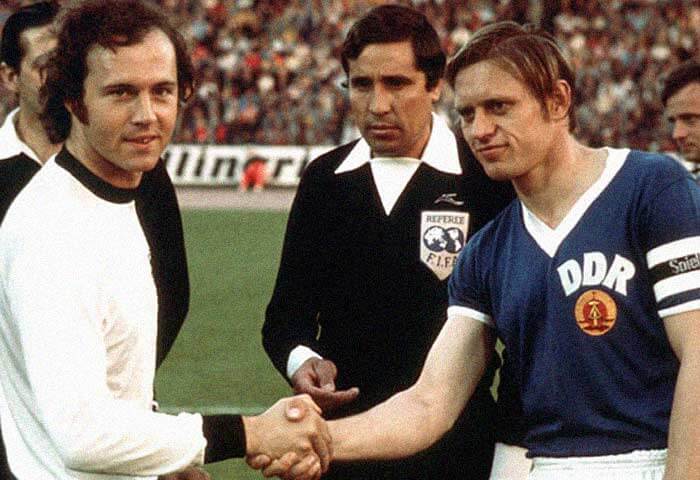 Beckenbauer and Bernd Bransch, the German Captains World Cup 1974
Beckenbauer and Bernd Bransch, the German Captains World Cup 1974
He played in both Germanies: Matthias Sammer, born in Dresden in 1967, grew up in East Germany and played in his youth with Dinamo Dresden in whose quarry he was formed. After the fall of the wall, he went on to play for VfB Stuttgart in West Germany. He also played for Inter Milan, but in the Club where he really had the most success was Borussia Dortmund where he contributed to the victory in the 1997 Champions League and two German Bundesligas. He was the 1996 Ballon d'Or already playing in West Germany which is really where he dazzled, he is an interesting player for having formed in the East quarry and becoming part of the cast of the great players of Germany after reunification. In this sense, it is a symbol of concord.
Historical moments: Jürgen Sparwasser, dazzled the world for a single stellar moment in football history, the famous goal scored by goalkeeper Sepp Maier that led to the victory against West Germany in the 1974 World Cup. It was a The group stage, but this goal earned the East Germans to classify first in the group over their German rivals, which meant they had to face more dangerous rivals, such as Brazil. As we have previously indicated, the RFA won the championship. These are the games of football's destiny. The DDR players finished sixth. Raced at the 1972 Olympics when East Germany took the Bronze Medal. His career was carried out mainly at FC Magdeburg where he contributed to this club winning three Oberligas in the 1970s. One year before the fall of the Berlin Wall, he moved to Western territory.
The DDR retro football shirts show the initials of Deutsche Demokratische Republik (the German Democratic Republic) its hallmark and together with its shield, a hammer and a compass with a circle of spikes that the go-around. Three very important levels of every State, agriculture, industry, and the thought and science represented by the compass.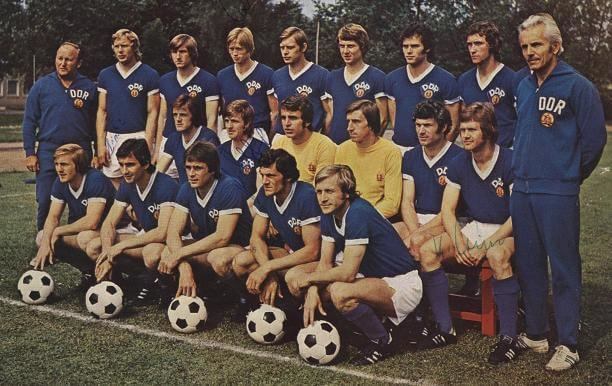 East Germany (DDR) vintage football shirt 1974
East Germany (DDR) vintage football shirt 1974
You can visit the Retrofootball® section dedicated to Germany vintage football shirts where we have reunited both national football teams. Among them you can find the famous Sparwasser goal shirt, the 1974 World Cup DDR Shirt, in blue or the white shirt 1974 World Cup DDR Away Shirt or the 1983 DDR Shirt.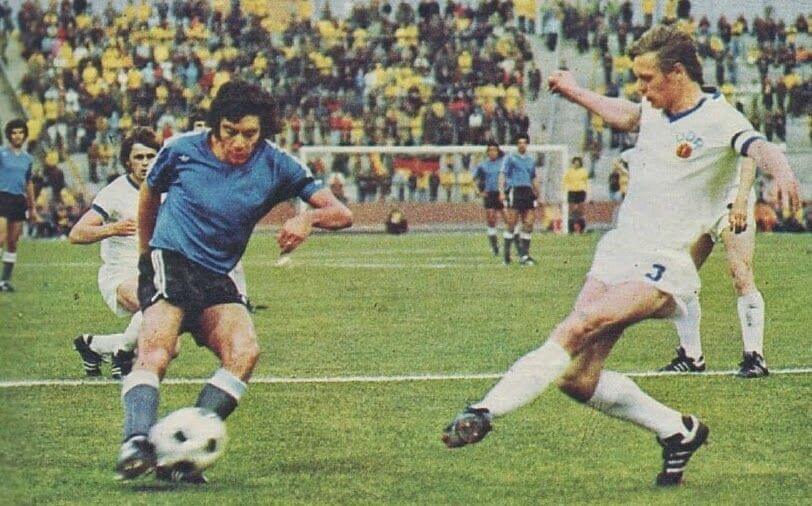 East Germany versus Argentina World Cup 1974
East Germany versus Argentina World Cup 1974
We love the history of football, and there is no doubt that the shirts of the block of East of Democratic Germany are a hit of our followers. Do not miss this symbol of a time that was leaving a trail of good times and especially of players who made the dreams of the fans possible.
 Retrofootball
Retrofootball  Belgium
Belgium  France
France  Germany
Germany  Italy
Italy  Portugal
Portugal  Spain
Spain  Switzerland
Switzerland  United Kingdom
United Kingdom  other countries
other countries  Retrorugby
Retrorugby 
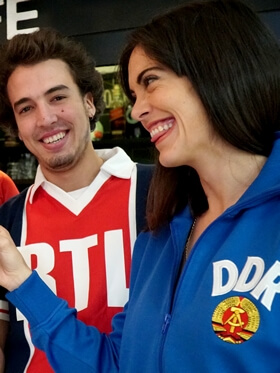
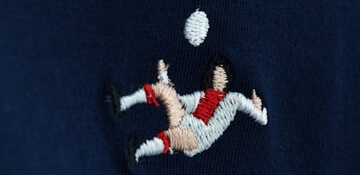




Post Comments